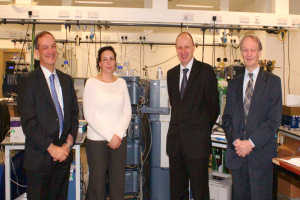The Waters Chair of Mass Spectrometry at the Michael Barber Centre
12 Jan 2012
The University of Manchester and Waters Corporation have announced the creation of the Waters Chair of Mass Spectrometry focusing on the many fields of research that utilise mass spectrometry technology.

Based in the Manchester Interdisciplinary Biocentre, the five-year post will lead the Michael Barber Centre.
The University’s partnership with Waters Corporation marks the beginning of a commercial and academic relationship between the two organisations, which builds upon a historical association with UMIST prior to the merger with the Victoria University of Manchester in 2004.
From the creation of the first commercial mass spectrometers in 1948, Manchester has been a world leader in this exciting, interdisciplinary field.
Brian Smith, Vice President of Mass Spectrometry Business Operations at Waters Corporation, said: "Manchester has an extraordinary heritage in both academic and commercial mass spectrometry.
“Our relationship with the University in this field goes back over 40 years, and it was our wish to strengthen that bond by building a true working partnership that would provide a continuing platform for world-leading research.
“Our work with the University has led to global impacts in the use of mass spectrometry for pharmaceutical development, food and beverage safety, forensics, environmental monitoring, sports doping and even locally into routine diagnostic use in Manchester's hospitals.
“We share the University's goals of being a leader in scientific research and technology innovation, and look forward to an exciting and creative partnership".
Professor Christopher Whitehead, Head of the School of Chemistry, echoed Mr Smith’s sentiments.
He said: “This partnership between the School of Chemistry, Waters Corporation and Manchester Interdisciplinary Biocentre will explore new challenges in the development of chemistry and instrumentation.
“Mass spectrometry is an enabling tool. Thirty-one groups work using this tool around the University. They range from atmospheric sciences to medicine to life sciences. So it’s a very versatile technique.
“A good proportion of the Waters Corporation research and development people are former students of the University and Waters are a major local employer in high-tech science instrumentation.
“To have an organisation like that in Manchester is quite special and we are looking forward to getting an internationally-leading researcher into the post in the first half of next year.”
The position of Chair in Mass Spectrometry is currently being recruited for and it is hoped that the position will be filled in the New Year.
